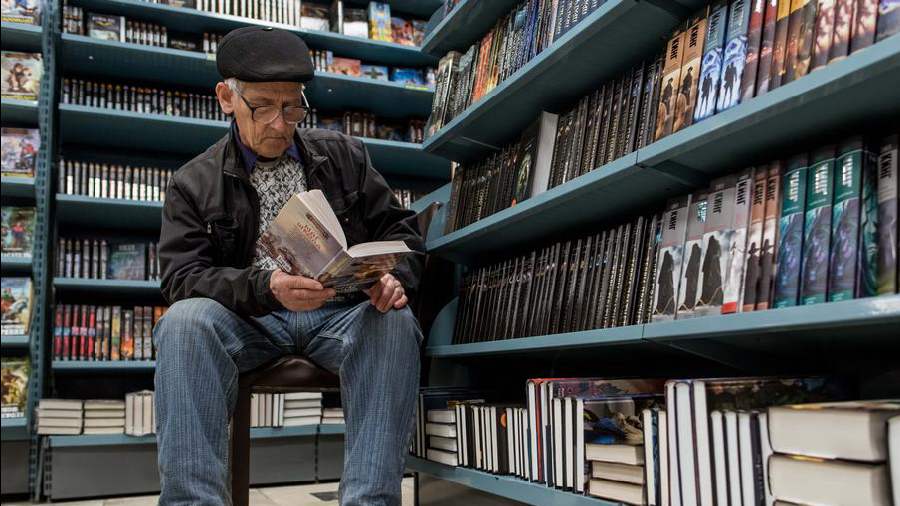Under Russia's new law on "LGBTQ propaganda," in effect since December, the distribution of any content considered to be an attempt to promote same-sex relationships and homosexuality can be punished. The legislation, which effectively outlaws any public expression of LGBTQ behavior or lifestyle in Russia, has resulted in a steady stream of book and film bans across the country.
Any person who says something positive about love between two men may be forced to dig deep into their wallets and pay a fine. Anybody who publicly supports a friend who is considering changing gender, especially on social media, is committing an offense. And anybody who praises a film in which two women kiss could end up in court. These examples, and many others, are now forbidden in Russia and can be punished with a fine of up to 5 million Russian rubles (around €65,000/$70,700).
Media regulator developing lists of banned material
This law has been in force for just over a month and is supposed to punish what has been called the promotion of "nontraditional sexual relations." It prohibits dissemination in any medium, including advertisements, books, films and media. By "nontraditional," the Russian authorities mean any sort of sexual activity between two men, or two women.
Moscow-based newspaper Vedomosti has reported that communications and media regulator Roskomnadzor has been developing definitions of what this sort of propaganda might be. Any products that contain matter that meets these definitions will be added to a special register and made inaccessible to the general public. Anybody who distributes the products can be prosecuted.
If a novel or a TV show portrays same-sex relationships as "attractive", presents a "distorted idea of the social equivalence of traditional and nontraditional sexual relationships" or contributes to "changing negative attitudes towards nontraditional sexual relationships into positive ones," then it will disappear from bookshelves or TV screens.
A preliminary list of movies that might meet this criteria has already been drawn up, Vedomosti reported. This list has already been sent to various streaming services. Unsurprisingly, films like "Brokeback Mountain" and "Call Me by Your Name" are on the list, along with certain episodes of the series "The Sex Lives of College Girls" and medical drama "This Is Going to Hurt."
Potential fines, court cases could ruin publishing sector
However, it may well be the publishing sector that has already been hit the hardest.
Oleg Novikov, founder of the Eksmo-AST Publishing Group, one of Russia's largest, complained to online magazine Tinkoff that the vague wording in the new law would put about half of all books on the Russian market at risk. Publishers don't know which books are going to be banned, he warned.
Alexey Ilin, head of publishing house Alpina, told DW that the law will bring serious risks to the publishing industry. Potential fines and court cases could ruin companies, he said.
Ilin said he had not had to remove any titles from his roster yet because Alpina had not printed anything that could be described as containing LGBTQ content. But he told DW he did know of bookshops that had already removed titles "in which same-sex love plays a clear role."
"Until recently, the publishing industry was not the focus of the state and the degree of freedom was relatively high," Ilin noted. "But now, the authorities have decided that many books contradict state policy."
Some Moscow libraries are thought to have received lists of books that would have to be taken off the shelves as early as the middle of December.
"A few months ago, it was still about books by so-called foreign agents," Vladimir Kosarevsky, the director of a large Moscow library, told DW. But this time, there were more than 60 titles by both international and Russian authors on the list. That included including Michael Cunningham, John Boyne, Stephen Fry, Haruki Murakami and Eduard Limonov.
'The law is discriminatory and must be abolished'
Kosarevsky is critical of the Russian state's increasing impositions on its citizens. "We are deprived of the possibility of expressing our own opinion, of making our own decisions," he said. "The law is discriminatory and must be abolished as soon as possible.
"If we accept this situation now, will members of the LGBTQ community be sent to prison camps next? Killed? These things happen gradually, bit by bit," he warned.
Igor Kochetkov, a Moscow-based human and LGBTQ rights activist, doesn't think the Kremlin will go that far. He believes the new law is mainly to do with the anti-Western rhetoric taking hold in the country. It's about creating the image of an enemy with "anti-Russian ideas" that wants to harm the country, he argued. He thinks it actually makes a lot of sense that this kind of discussion is becoming more heated at the moment, given the war in Ukraine and the fact that the Russian government wants its citizens to unite behind it.
Since Russia launched its invasion last February, the Russian state has been telling locals that it isn't actually fighting Ukraine. Instead, it is opposed to the so-called collective West — that is, the United States and the European Union.
"There are people who actually believe this helps to mobilize public opinion in favor of supporting the war," said Kochetkov. But he doesn't think it will work. "Russian society is much further ahead than its leadership," he said.











